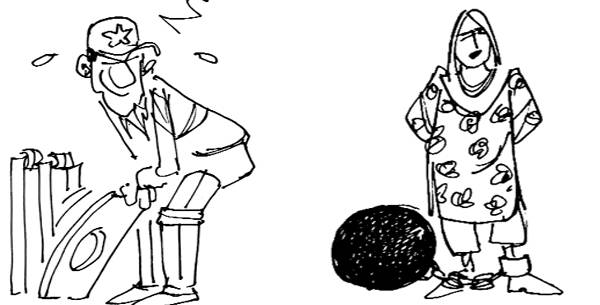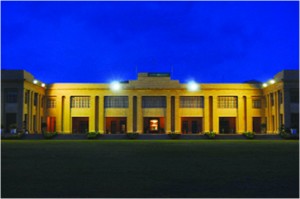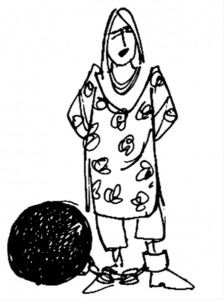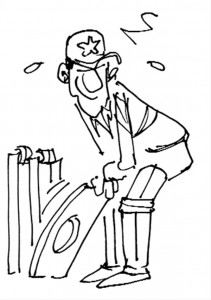
Sindh Governor House threatened

Sir,
What has gone wrong in India? It is stunning to discover that someone from India called a staff member of the Sindh Governor on October 23 and threatened to blow up the Governor House. How unthinkable! Sometime back, an Indian called from the foreign ministry office in New Delhi and threatened the president of Pakistan of dire consequences for some imagined offense. Later, the foreign ministry clarified that the call was made erroneously.
I have had many interactions with Indians, and some, not all, have been found to be extremely anti-Pakistan. On border posts, overly excited Indian troops usually open firing on Pakistani troops for kicks, and in Indian-held Kashmir, they resort to a number of crimes. The caller who threatened the then president’s staff was later reported to have been drunk. One can assume that the October 23 call threatening Governor Ishratul Ibad must have been a case of an ‘official’, who had one too many shots of alcohol. But the point to be noted is the phobic hatred against Pakistan is part of these individuals’ identities.
Intelligence and law enforcement agencies will certainly trace the caller and ascertain the motive of the call, but if it is the same case of someone who was drunk, then the India government can surely understand that such a hoax call can also cause irreparable and irreversible damage to the South Asian region.
Marya Mufty,
Lahore.
Too late to apologise

Sir,
Tony Blair, the former prime minister of Britain, has sought a pardon from the nation over his role in the war on Iraq. Is a pardon for Blair justified after the lapse of almost 15 years? His pardon is another joke, with his first joke with the Britain being that Iraq possessed chemical weapons. He misled the people of Britain and people living around the world. He admitted that he made a mistake when attacking Iraq on ‘flimsy grounds’. Now the question is, will nations like Britain and all members of the United Nations, which also supported the lies spewed by Bush and Blair during the Iraq war, give him a pardon? Let’s suppose everyone pardons his actions, who will pay the price of the Iraq war and its aftermath? Thousands of people have been killed and the world has certainly become unsafe due to this war grounds. Will pardoning Blair give any meaning to those who lost their lives in the war? The timing of his seeking a pardon is no coincidence, as the report on the Iraq war will be made public in a few days. The way the United Nations supported all the moves made by Bush and Blair, the UN is also to blame. Britain itself lost hundreds of its young military men and women, and their families are still suffering. The Iraqi people are suffering to this day. Bush and Blair are two war criminals, and they are beyond any pardons. The UN also suffered a great setback due to the Iraq war. The UN’s priorities have changed, and a new conflict is brewing in the Middle East, with Iraq at its centre. Now, the UN must set its priorities straight, so that no world leader, like Blair and Bush before, can fool the world body and lead it astray. No sane person or institution will pardon Blair’s lies, which cost the world thousands of lives and billions of dollars.
Aijaz Ali Khuwaja,
Karachi.
Stop it already

Sir,
It never really ends. When misogyny stems from our very households, how can we blame anyone else. Daughters and sister are bossed around and asked to do everything from the menial to the ridiculous. When you grow up in a household where men are to be served by you (the women), it automatically sits down somewhere in your subconscious that this is how its supposed to be. Personally, I blame women more for the misogynist society that we live in more than the men. Be it the rural or the urban section of our society, women are the ones who bring up sons like they were born to have women at their beck and call, be it their mothers, sisters, wives or daughters.
The mindset you find in our rural population, ironically, has also become a status symbol. Big feudal families look down upon women who think differently.
Putting your wife in a burqa and ogling every other woman passing by doesn’t make you much pious. But then placing women in item numbers, dressing them scantily in films, having mujras to celebrate weddings. Placing a woman in a fuel or a razor commercial is not going to help change the set up. Especially when you’re objectifying them at this level. On television, on print media, on big billboards, how can we even expect even a little change in men’s attitudes towards women? It’s sad to be in a situation like this, but we as a society have not evolved or advanced.
So can you blame the havoc in a workplace when they see a woman stepping out of her house to earn a living? What can one say about the struggle a woman has to go through to maintain a working relationship with her colleagues, to be taken seriously by the people she’s working with from the sweeper to her boss, warding off sexual harassment attempts everyday, sadly not always succeeding. It can take her months to years to bring herself to the position where she’s listened to, and is respected. No fault of her own, but because men are unconsciously brought up in a way where taking a woman and what she says seriously is like a little joke to them.
If we want to change this mindset we need to educate our women, we need to start instilling respect for women in our sons at a very young age. We need to teach our daughters to be strong-willed and independent. Only then will we have a chance to fight back against patriarchy. Or at least learn to live together as equal citizens with mutual respect.
Rabia Chaudhry,
Karachi.
Animals matter
Sir,
Animal welfare is the least talked about topic in our country and sadly not many are interested to consider it important either. The moment you initiate a discussion regarding animal abuse and how their welfare is being neglected, the most common remark you receive is 'yahan insaano ko itnay maslay hain, apko jaanwaro ki parhi hai?' (Here humans have so many issues and you're worried about animals?) which in my opinion is quite a rubbish response. How is animal welfare, in any way linked to human welfare? The suffering of humans are not inflicted by animals. They are not the cause of corruption, poverty or terrorism in our society. Have you ever seen a dog wearing a suicide jacket and exploding itself? Then why should they suffer? Why hitting a dog with a stone or a stick on the road 'just for fun' isn't considered a crime? Why don't people find it bothersome when they see a donkey pulling an overloaded cart? Why can't the owner be a little less selfish? Why is that cars don't pull over when they see an injured animal on the side of the road? Have we lost absolutely all compassion?
We love to portray ourselves as pious and religious people but have we ever thought how kindness towards animals has specifically been mentioned in Islam? Have we ever practiced or even, tried to practice this?
Pakistan has a lot of issues and we have a lot of other matters to solve but animals shouldn't suffer. Non-profit international organisations like SPCA (A Society for the Prevention of Cruelty to Animals) which exists in Pakistan but are not functional should be made functional. The government needs to have a heart and be more compassionate. As Gandhi said: 'The greatness of a nation can be judged by the way it's animals are treated.' And our withering nation is definitely in need of some greatness!
Aima Yusuf,
Lahore.
Talking works
Sir,
Dialogue is the most essential thing that brings together people and allows for the cultivation of ideas and tolerance. Sadly there are not many forums where dialogue can take place. Our younger generation are growing up in a society where dialogue is a rare thing. They cannot get together in any space and learn from one another by doing nothing else but talking. All that would be required is a little space where people can coverage and discuss ideas and dialogues. Our metropolitan cities need more spaces where young people and old from different backgrounds and of different classes can meet, sit down, and talk amongst each other about everything from religion, politics, ideology, economy etc. The only way forward for us to be a tolerant and more inclusive society is for us to allow for more spaces where ideas can freely flow and be discussed without fear of reprisal of without fear of being judged.
If we get this done, there is a brighter future in store for our younger generation. We may still leave for them a country that is one that they feel safe living in and feel proud of.
Ramis Ahmed,
Karachi.
Closer ties
Sir,
With the return of Geeta to India we are presented with an amazing opportunity to cash in on some goodwill with the people of India. For too long we have been at loggerheads with our neighbours and this trend does not seem like it will end any time soon. This is an ideal opportunity much like when Malala won a Nobel peace price with an Indian to try and bring together people of both countries around a symbol that encompasses peace and tolerance in south Asia. The government's of both countries need to get their acts together and learn from people who go above and beyond in taking care of each other and they should let this be the guide they need to promote peace in the future.
Fatima Zahra,
Islamabad.
Brilliant initiative

Sir,
For the longest time, I’ve seen and realised that reading has become a lost cause in our country. Book reading and book selling have become a purely commercial enterprise. Books are sealed away in plastics on store shelves, and one cannot skim through them even without purchasing the book and tearing that plastic off. Very few bookstores seem to bother stocking up on obscure non-fiction that strays from perhaps what is mainstream, but is exactly what we need to read in order to broaden our thinking and learn more than what we are spoon fed. It brings me some comfort to see new stores opening up like Books n Beans that allow people to sit for hours and just browse through books to get a better idea of what they are committing to read. Such ventures make it more about the experience of reading than the concept of simply paying over the counter for a book that will perhaps end up collecting dust in ones shelf.
We need to support such causes and such endeavours if we as a nation are to reconnect with our literary roots. We who claim to be from the land of the poets and Sufis have unfortunately not done justice to our heritage and our past. The written word has lost its significance over the decades, but one can never give up hope. We need to engage with our youth more, and instil in them from a very early age a passion for reading not to pass the time but for the experience itself. That is the only way we can hope to reclaim our past glory and do right by what was done by our forefathers.
Asad Hashim,
Lahore.
The Captain

Sir,
Cricket is perhaps the only thing relatable and reachable to the common man. You certainly do not need a bank account to enjoy the game. Staying on the subject of money, one also does not need to live an ostentatious lifestyle to watch cricket. No need of spending at food courts of overcrowded and congested malls in the country’s urban centers to watch a mega cricket tournament like the ICC World Cup. It can be viewed in a nice and quiet café, sipping away at some nice sweet tea while enjoying some delicious hot jalebi.
The majority of the country has some really interesting opinions about the game. One particular topic of great interest is who will captain the Pakistan Cricket Team? To some, being the captain of the team is considered to be the 3rd most powerful position in the country. Pakistani cricket has more or less always been synonymous with one man – the legend Imran Khan. His absolute great skill and talent, not only as a player but as a captain, gave us fans amazing memories. When I say memories, I don’t just mean the 1992 World Cup, but memories in the form of players such as Wasim Akram, Inzamamul Haq, Waqar Younis, Moin Khan and Mushtaq Ahmed to say the least. These players were discovered by the great Imran Khan, and these world class players gave us some outstanding performances.
The current Pakistani test captain, Misbahul Haq, isn’t that far behind Imran Khan. He might not have the potential to recognise talent like Imran, but his patience and determination is something that should be applause. Like Imran Khan, Misbah too hails from Mianwali, where men are considered to be quite tall and strong. Misbah is certainly no less. He stands at 6ft 1 and has a very broad physique. He is often termed as a warrior. He might not have the energy and agility of Imran, but he certainly has one thing that no captain has ever possessed – an unflappable temperament. It is because of such a temperament that he has received his recent success. The cool and calm manner in which he goes about his batting, managing his side and dealing with the ever so critical media is really second to none. Yes, it is true that Misbah usually plays in a defensive manner, something that has gotten him unfair criticism and cheap publicity. But if anyone has the slightest understanding of the game knows that when a team is 35 for 4, you can’t exactly go all guns blazing, but rather slowly and gradually build an innings. His knock during the 2nd test against Australia at Abu Dhabi last year, where he scored the fastest half-century and equaled the fastest century record, proves that Misbah is also very fierce with the bat. That innings was played when Pakistan had already put up a good score. One can even say that Misbah does indeed play according to the situation at hand. Wise indeed!
Misbah first came into the test side during Pakistan’s 2001 tour of New Zealand. He played a very patient innings of 28 at Auckland. Unfortunately, we did not get to see Misbah so much in the Pakistan team. Between 2003-2007, Misbah did not play a single test. A handful of runs in the domestic circuit brought him back into the side. It is said that a person’s true character and test comes into play during the hour of need. Misbah certainly showed such character. He became captain of Pakistan after the horrific 2010 tour of England when Pakistan was rocked by a spot-fixing scandal. Morale was down and all hope seemed lost. However, the silent hero did what needed to be done – keep the focus on the game, do your bit and do not provide any input on how to play the game to any player. With such an approach, Misbah took the team out of misery and earned respect from each and every player.
Misbahul Haq also had to deal with playing the majority of test matches during his captaincy, abroad. Yes, he led a Pakistani team in exile where the current crop of young players dream of test cricket returning back to Pakistan. All in all, Misbah has done a phenomenal job as captain and will hopefully be remembered as one of the best that Pakistan has ever had.
Mohsin Ali Syed,
Lahore.

